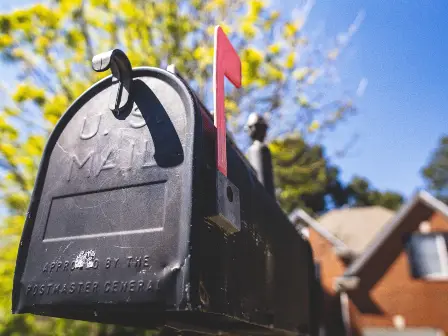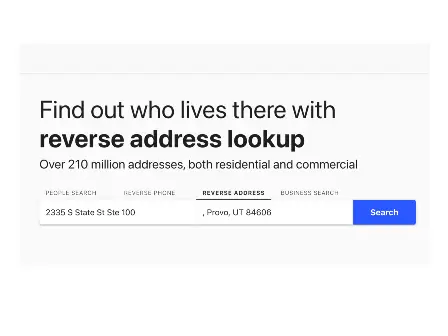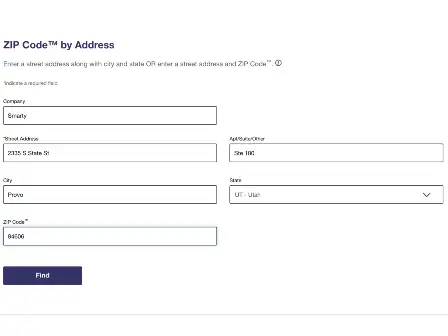Address lookup | Free tools, types, uses, and resources

An address lookup is the process of checking a parcel or street address against an authoritative database to verify if the address is real and mailable. Performing an address lookup may also provide additional data points, like whether the address is residential or commercial, is vacant, or is incomplete.
While this definition is among the most common for "address lookup," here are other things people are trying to find when they Google the term.
- Reverse address lookup: The intent to find out who lives at a provided address.
- Property data lookup: Finding data about a property such as acreage, tax class, zoning, land value, census data, boundaries, data about the structure, etc.
- People search: Using a person's name, city name, and state in order to find matching addresses where the person may live, work, or receive mail.
- Reverse geocoding address lookup: Using a latitude and longitude geographic coordinate to find an address, often used in natural disaster recovery efforts, where street signs and structures may have burned down completely or been washed away.
Smarty specializes in address lookup APIs to determine if addresses are real. Both for addresses in the United States and worldwide. We offer several ways to access our address lookup data:
| US & International SINGLE Address Lookup Tool | US & International BULK Address Lookup Tool | United States Address Lookup API | International Address Lookup API |
|---|---|---|---|
In this article, we'll cover:
- Types of common address lookups and tools
- Verification address lookup
- Reverse address lookup
- Reverse geocoding address lookup
- People search
- Property data lookup
- USPS address lookup
- Address lookup APIs
- Conclusion
Types of common address lookups and tools
You've heard the saying "Time is money." It's true. Everything you do requires an investment of one or the other, and sometimes both. So, to help you save time and money with your customer addresses, we've compiled the following list of common address lookup types and the information each provides. We've even connected you to providers in the event you don't happen to need the types of lookup Smarty offers.

Verification address lookup
Verification address lookups (also called validation address lookups) allow you to quickly and easily determine if an address exists. The process also corrects misspellings, reformats the address to the standardized format of the local postal authority, and can append missing information such as the ZIP+4 Code. Addresses searched in this way are determined to be valid or invalid. A valid address is simply one that's real and mailable.
An invalid address could be one that is fake, incorrect, incomplete, or not registered to receive mail (e.g., because the address is too new).
Address verification is important for a lot of reasons. One of the biggest is to save businesses money. Businesses that mail ads, coupons, etc, to potential customers, want to ensure they are getting as much exposure as possible for their money. With Smarty's single address lookup and bulk address verification system, businesses can check the validity of their list to make sure they're not wasting money sending mail to invalid or vacant addresses.
Speaking of saving money, validating addresses and presorting mail is one requirement for getting bulk shipping discounts. Similarly, companies that send installers or technicians to homes benefit from validating the destination address to prevent technicians from getting lost or spending time searching for the right address. That helps them save money in terms of person-hours and prevents frustrated customers.
Another way businesses save money through address verification is by cleaning and standardizing their address databases. This eliminates duplicate customer addresses and records to provide for a more accurate meta-analysis. More correct address data helps ensure marketing budgets are more efficient, ad spending is more accurate, expansion is more targeted, and much more.
Cleaning and standardizing database information helps businesses and other entities merge their datasets. For example, whenever someone purchases a home or other property, registers a company, participates in the census, is arrested, or even receives a traffic ticket, they need to provide an address. The problem is that the address fields for these various databases are not consistent, which makes comparing or matching them nearly impossible. But, by validating and standardizing the addresses in these databases, each person is identified with a unique value. Once each person has a unique value, the options for using the corrected information are endless.
Smarty helps these major data aggregators validate billions of addresses. See how we can help you validate and standardize your data.

Reverse address lookup
A reverse address lookup allows you to locate information about the current resident, previous resident, current property owner, and other data using nothing but a structure's address. This makes it fast and easy to connect an address to a name for real estate, advertising, employee relocation efforts, arranging reunions, verifying online dating profiles, and much more.
Whitepages.com is one of the most popular reverse address lookup platforms and uses address data from Smarty in their results. Beyond address data, Whitepages offers a premium subscription, which unlocks everything from phone numbers (land and cell) to other properties owned, public criminal records, licenses, permits, and a host of further details.
Reverse geocoding address lookup
Reverse geocoding address lookups are performed by entering the latitude and longitude coordinates into a search field. By entering the geographic coordinates, this type of lookup will then return relevant street addresses associated with those coordinates. Use cases for this type of lookup range from natural disaster recovery efforts (where street name signs and buildings may have washed away), to fleet management, strategic growth plans, and more. This lookup type turns locations into addresses.
People search address lookup
But what if you have only a name and no address? No worries. A people search address lookup allows you to get the address you need, plus information on relatives, age, property details, and more.
Granted, you may need to sift through a few results to find the one you're looking for, but it's much faster and more accurate than just putting a person's name in a search engine and hoping to find them. Knowing the person's city and state can help find relevant results in Whitepages even faster.
Property data address lookup
A property data address lookup provides metadata about the address in question. For example, you can find out what county the address is in, what school district it belongs to, if it's in foreclosure, what its property lines look like, the property tax imposed on it, sales tax from its last sale, property value, and hundreds of other data points pulled from public records and other verified sources.
Telecommunication
If you’re in telecom and you’re better building or expanding your network, knowing the details about a property is essential for avoiding surprises. Analyzing lot size, long driveways, or extra buildings like barns or guesthouses gives you a clearer picture of how straightforward or complex an install might be.
Knowing about the property allows telecoms to estimate labor and materials more accurately, saving time, money, and headaches.
Property data goes way beyond installation logistics, though.
It also helps organizations figure out where to lay fiber, place small cells or towers, and ensure they’re staying compliant with zoning and easement laws, as well as spot underserved areas and plan network expansions that actually match local demand. If someone’s got features like smart sprinklers or home security systems, that’s a solid clue they’d benefit from high-speed internet or smart home bundles.
Telecom and ISPs even use this data to target specific customer demographics, manage existing infrastructure, or work with urban planners to avoid conflicts down the line. The more telecoms know about a property, the better they can plan, build, quote, and serve their customers.
Fintechs and financial institutions
You can use property data to streamline application flows, assess investment potential, and surface fraud indicators.
Insurance carriers
Carriers use property data lookups to pre-fill the questions on their commercial property, residential property, and automotive insurance applications. They also use this data to create risk models, assessing the viability of selling a particular policy type in any given area. If a policy is viable, they'll most likely have specific requirements for eligibility.
Healthcare organizations
Healthcare professionals use property data lookups because of the granularity of the data. Property data can reveal housing quality indicators (age, type, presence of lead risks, etc.) that assist with Social determinants of health (SDOH) initiatives. Furthermore, accurate address records and property data help verify a patient’s residence for home health risk models (flood zones, stairs, or rural/urban status for in-home care suitability). Healthcare facility planning and network expansion are also empowered by property data analytics as healthcare systems can identify ideal locations for new clinics or urgent care centers and understand local property types and demographics.
Ecommerce
In retail ecommerce, tapping into detailed property data levels up how retailers connect with customers and operate.
For example, when ecommerce providers know someone has a patio, pool, or RV parking, they can recommend relevant things this customer is actually interested in, like outdoor furniture, pool accessories, or RV gear. There’s no point in sending a mailer with a pool discount on a pool install if someone lives in an apartment building.
If a property includes features like a wine cellar, sauna, or tennis court, that signals they’re into higher-end or luxury items, so online retailers can tailor product recommendations accurately and offer themed bundles, like “pool party starter kits” or gardening tools for folks with greenhouses or sheds.
It also plays a role in big-picture strategy to decide store locations, merchandising, and even lease negotiations as well as provide competitive intel (who else is in the area), supply chain optimization (like where to place warehouses), and even risk assessment and revenue forecasting.
And there are SO many other use cases and industries who could benefit from property data lookups, too.
Smarty provides US Property Data lookups with over 350+ property data reports that inform investment decisions and risk analysis.
Learning the structure elevation, city name, mailing address’s topography, roof type, prior sale amounts, and other financial information surrounding an address can help any business enhance their market analysis. With hundreds of datapoints surrounding an address, the only way to go is up.

USPS address lookup
Many people are familiar with and use the address lookup tool the USPS offers. This tool is a good option as it is easy to use, free, and doesn't require any setup.
The tool also returns addresses in standard USPS format, which helps ensure mail pieces are processed smoothly. Finally, you can integrate USPS Web Tools® into a website for free —if you have the know-how.
But as great as the USPS address lookup tool is, it's not without limitations. Here are a few things to be aware of if you're going to use it:
- Address entry is laborious —You must enter your address in multiple fields and click various buttons before you get the info you're entering into that search bar. In contrast, with Smarty, you can enter the address in one field and click one button. Done.
- USPS doesn't offer an address autocomplete —This just means your entries are begging for more typos, time, and frustration.
- The USPS Database is missing millions of addresses —There are over 20 million valid, non-postal (non-USPS) addresses in the United States. That's a big crowd you could be missing out on in your mailing list.
- The Postal Service offers no international address data —The name says it all: United States Postal Service. If you need international information and validation, you'll have to look elsewhere. Hint: give Smarty a try.
- USPS address lookups lack useful metadata —Smarty offers 39 more metadata fields than the USPS tool, such as County FIPS Code, EWS match, Congressional district, time zones, and more.
- Address validation by the USPS has strict terms of service —The legal stuff no one looks at? Turns out it's important. Check out this article about USPS Address Verification for more information on their terms of service.
Smarty's address lookup products, US Address Verification and International Address Verification, overcome each of the USPS limitations and so much more. You really should try our address verification API for free today.

Address lookup APIs
An address lookup API is an Application Programming Interface (API) that processes addresses. The address API verifies, standardizes, and normalizes address information. This allows for more correct address information, which means more precise delivery and more money for your business. It's a win for everyone.
There are a lot of address APIs that can be quite useful to you. They include:
- Address correction APIs—This takes improperly formatted addresses, or those with typos, and matches them with a validated address.
- USPS Address Validation API—The official database for the United States, the USPS API makes its information available to the public. However, their system leaves much to be desired, which is where Smarty really shines.
- Google Address Validation API—One of the most used address validation tools on the internet, even though it doesn't actually validate addresses. It approximates the location of an address and does that very well, but it doesn't let you know if the address is real.
- Address Standardization APIs—These APIs take an address and standardize it to USPS requirements for US addresses or to the local postal authority for the country of the address location. Google and many other mail address lookup services don't do that. Smarty does.
- ZIP Code APIs—Contrary to common belief, ZIP Codes and postal codes are not the same thing. "ZIP Code" is the name for the postal code system created by the USPS for the United States. The term "postal codes" is the blanket term used for codes that postal systems across the world use that aid in sorting mail. ZIP Code APIs return relevant USPS ZIP Codes for an entered city and state or matching city and state combinations with the entry of a ZIP Code. Other data such as ZIP Code type, county FIPS Code, county name, and lat long coordinates can also be provided.
- Geocoding APIs —These tools provide the latitude and longitude coordinates of an address so you can locate it precisely on a map or on GPS.
To dive deeper into the importance of these address APIs and what they provide, see our Address APIs article. Or, if you want to enjoy the benefits of all of them, simply perform an address lookup with Smarty. It really is that easy.
Conclusion
As you can see, there are many ways to look up an address. There are many benefits to doing so, and there are many free services you can use.
Regardless of what your specific needs are, (updating a mailing list, checking your database is full of only accurate addresses, discovering parcel data, etc.), performing address lookups can be useful.
With Smarty, you get ludicrous speed, easy-to-understand documentation, high accuracy, 100% uptime, and simple implementation for any address verification, geolocation, property data, or autocomplete needs.
Plus, you can talk to an address expert when you have questions. From now on, all your address lookups can be better than good. They can be amazing! Take our address lookup tools for a spin. Then sign up for a 42-day free trial.